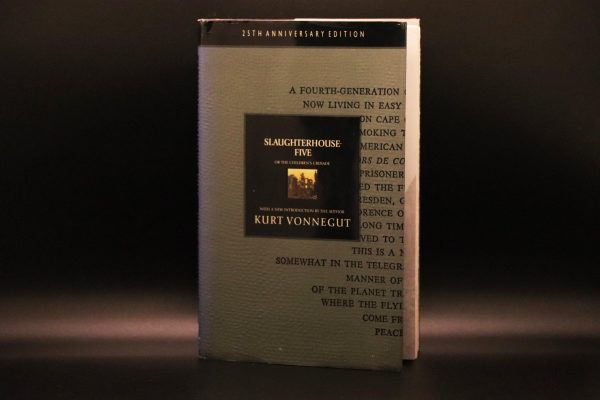George Orwell’s “Nineteen Eighty-Four”
George Orwell has once again applied his talents to a new book, this time set in a world that feels much closer to home.
It focuses on a middle-aged man, Winston Smith, as he goes about his life in a post-revolutionary London. His England is a totalitarian regime, having diverged from our own due to revolutions in the 1950s. Great Britain, known instead as “Airstrip One,” is a far cry from our own — and yet it feels eerily familiar. His narration (which, by nature, is unreliable) is succinct despite the many unknowns as he guides us through a world where thoughts themselves are as criminal as rebellion.
And woven through it all are the foreboding threads of a world where even the idea of independence is no longer. Writing, speech, actions — everything is censored and suppressed until it is left unrecognizable. The government, known only as The Party, even attempts to control the mind itself. The idea of freedom has been so twisted and manipulated that it is unrecognizable and incomprehensible. Indeed, this is illustrated by the party slogan — referenced repeatedly throughout the book — FREEDOM IS SLAVERY.
There are few subjects that hit us harder than the loss of our rights, and yet somehow this book seems to explore all of them within this context. Orwell pits family members against each other, turns love to despair, and makes people into basal, brainless animals.
Winston’s story is further complicated by his urge to rebel. He has a deep-seated desire to do anything he can to break the rules of The Party. Over the course of the story, this progresses from benign actions, like meeting the eyes of people he doesn’t know, to overt acts of subterfuge and sabotage. He loves someone that The Party has forbidden him from loving, and he does it almost solely because he cannot. In many ways, his actions are a childish and immature rebuttal of authority; yet they’re deliberately prepared. Indeed, his thoughts seem to be constantly occupied with planning for whatever small rebellion he can make, no matter how insignificant.
However, he is acutely aware of the dangers that his nonconformity poses — and dangers there are many.
The most chilling of these are the telescreens: devices set into the walls of homes and offices that blare out propaganda and record everything that occurs around them. They can’t be turned off, and their mind-numbing stream of patriotic drivel serves only to further The Party’s hold on the minds of its citizens. The telescreens provide a constant, omnipresent surveillance network for The Party’s most mysterious branch, the Thought Police.
The Thought Police are the real threat behind the telescreens, the keystone of The Party’s attempt to control the minds of its citizens. They analyze every action made by every citizen, attempting to infer the motives behind even the simplest gestures. They are presented as omniscient oppressors, able to observe everything without regard to privacy. If anyone is even suspected of committing thoughtcrime, or unorthodox thinking, they are simply erased from existence. Far beyond killing them, the Thought Police remove every mention of them from history, and destroy any documents with contradictory information.
Orwell expands on this idea through discussions of the permanence of the past. If you did not personally experience something, how can you be sure it even happened — and even if you did, how can you know that you aren’t entirely unreliable?
Philosophical explorations like this underpin Orwell’s science fiction masterpiece, making it as much an exploration of the human condition as a powerful story. The most profound part of Nineteen Eighty-Four, lies not necessarily with its emotional power or depth, but instead in its chilling and ever-more-apt examination of a world in total violation of the most basic human rights.














